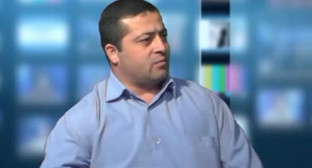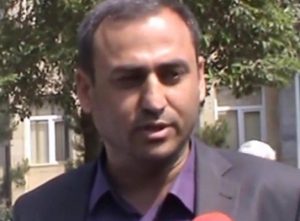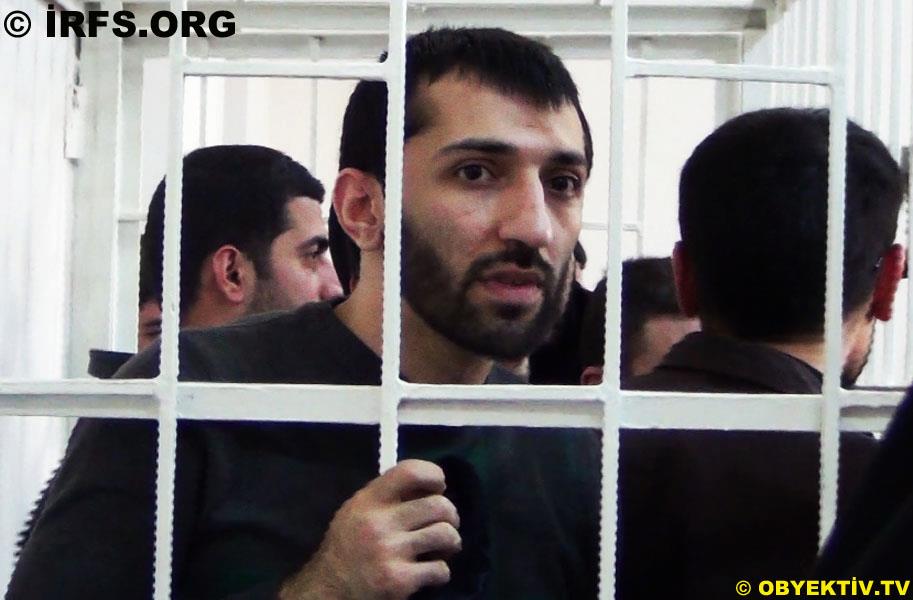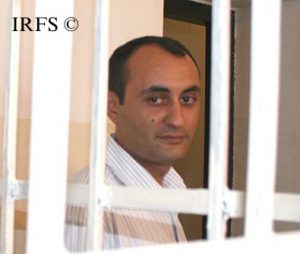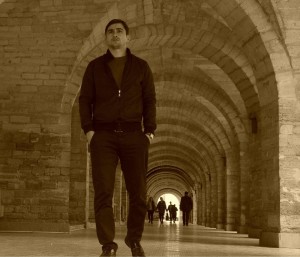14 Jul 2017 | Azerbaijan, Digital Freedom, Mapping Media Freedom, Media Freedom, media freedom featured, News and features
[vc_row][vc_column][vc_column_text]
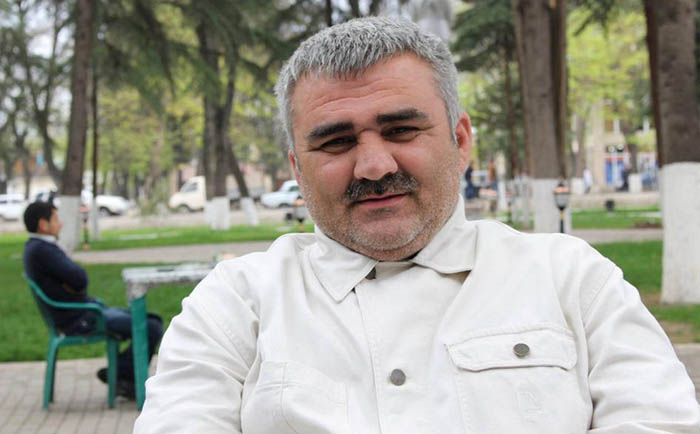
Afgan Mukhtarli. Credit: Meydan TV
Media outlets in Azerbaijan routinely deal with torture, assault, raids, imprisonment and endless intimidation, as verified reports submitted to Index on Censorship’s Mapping Media Freedom project show.
“The years-long crackdown on the independent press by the regime of Ilham Aliyev has accelerated in recent months. This is clearly one of the world’s worst environments for press freedom and, consequently, for the public’s right to information,” Hannah Machlin, project manager for Mapping Media Freedom, said.
International media freedom rankings confirm the country’s stagnating record where autocratic repression is consistent, if not the functioning political system itself. Although authorities continue to claim that the majority of the country’s 147 political prisoners are criminals, religious radicals and tax evaders, the international community of rights watchdogs view it differently. A new wave of attacks against media freedom advocates, journalists and activists within the past two months alone illustrate a place where the primacy of Ilham Aliyev, Azerbaijan’s president, and his word overrides the primacy of the words of others, particularly his critics.
One such critic, Afgan Mukhtarli, an investigative journalist, disappeared on 29 May while on his way to his home in Tbilisi. Mukhtarli reappeared the next day across the border in Azerbaijan and was accused of illegal border crossing, smuggling (police allegedly found €12,000 on him) and resisting police. He was immediately sentenced to three months in pre-trial detention.
Speaking to Mapping Media Freedom, Mukhtarli’s wife Leyla Mustafayeva said she was relieved when she heard news of his arrest because after reporting her husband missing the day before, she had assumed he was dead. However, that is the only relief Mustafayeva has had since her husband’s kidnapping:
“I have no hope for the investigations. They have been stalled. They don’t want to investigate. Police allegedly cannot find any footage. The only video that was made available to our lawyer was shown two weeks after Mukhtarli’s disappearance and it’s just of my husband getting on the bus that usually takes him home.”
Mukhtarli’s case is unique in that his is the first cross-border operation alleged to be carried out in tandem with the Georgian government. While this has yet to be confirmed by officials in Georgia, Azerbaijani lawmaker and a member of the Parliament Human Rights Committee Elman Nasirov claimed Mukhtarli’s kidnapping was “the most successful operation carried out in recent years.” Nasirov also accused Mukhtarli of being a member of a far larger anti-Azerbaijan network.
[/vc_column_text][/vc_column][/vc_row][vc_row][vc_column][vc_separator color=”black” align=”align_left”][vc_row_inner][vc_column_inner width=”1/2″][vc_custom_heading text=”Mapping Media Freedom: Azerbaijan” font_container=”tag:p|font_size:24|text_align:left” use_theme_fonts=”yes” link=”url:https%3A%2F%2Fmappingmediafreedom.org%2Fplus%2F%3Fs%3DAzerbaijan|||”][vc_column_text]Index on Censorship monitors press freedom in Azerbaijan and 41 other European area countries.
As of 14/07/2017, there were 60 verified reports of violations connected to Azerbaijan in the Mapping Media Freedom database.[/vc_column_text][/vc_column_inner][vc_column_inner width=”1/2″][vc_single_image image=”94222″ img_size=”full” alignment=”center” onclick=”custom_link” link=”https://mappingmediafreedom.org/#/”][/vc_column_inner][/vc_row_inner][vc_separator color=”black” align=”align_left”][/vc_column][/vc_row][vc_row][vc_column][vc_column_text]“Muktharli was assigned to carry out subversive activities in Azerbaijan,” Nasirov asserted, claiming that as a preventive mechanism, Azerbaijani special forces made necessary arrangements with Georgian special forces. “The are principles and rules for this. Based on security principles, this how it was made possible to bring Mukhtarli to Azerbaijan,” said Nasirov in an interview with Azadlig Radio, the Azerbaijani service for Radio Free Europe Radio Liberty.
Police have questioned political activists, members of opposition parties, and journalists as part of the investigation. Sevinc Vagifqizi, a freelance reporter, was detained while waiting for news outside the state border services where Mukhtarli was being held. Speaking to journalists after her brief detention, Vagifqizi said that police allegedly thought she was going to disturb peace outside the building. Other journalists who have been questioned in the case of Mukhtarli are investigative journalist Khadija Ismayilova, who is facing a travel ban despite her release from jail, and, more recently, Aytac Ahmadova.
The circumstances of Mukhtalri’s arrest were notably suspicious. Outside of his abduction, Mukhtarli’s lawyer was also quick to report on the injuries Mukhtarli suffered, including a broken nose, multiple bruises and possibly a broken rib. Mukhtarli is not the only journalist who appears to have been subjected to alleged police brutality. Nijat Amiraslanov, a member of the NIDA civic movement and an independent journalist based in Gazakh, reportedly lost his front teeth while serving his 30-day administrative detention. In his statement, however, Amiraslanov said his teeth fell out on their own, and that there was no ill-treatment during his detention. After Amiraslanov’s teeth fell out, the journalist refused an appeal filed by his lawyer. Amiraslanov was released on 21 June after completing the detention period.
In another show of force, police raided the office of independent online television channel Kanal 13 on 3 June, confiscating computers and other documents. Police had already detained the channel’s manager Aziz Orucov (Garashoglu) earlier in May. Orucov was sentenced to 30 days of administrative detention on the grounds of allegedly resisting police. Additional charges of illegal entrepreneurship and abuse of power were brought against Orucov on the day of his release. He was sentenced to four months in pre-trial detention.
While these men await trial, another journalist and editor-in-chief of the news website Journalistic Research Center (jam.az) Fikrat Faramazoglu was sentenced to seven years in jail on 14 June. Faramazoglu was found guilty on charges of extortion. In his defence statement, the journalist said it was his reporting on a chain of brothels that were protected by the law-enforcement agencies that incited his arrest. Faramazoglu was also banned from working as a journalist for two years following the completion of his prison term.
A classic case of revolving door policy
Rather than continue to release its political prisoners, the Azerbaijani government continues to arrest more reporters and further tightens controls on the media sector.
“There are some ten journalists and bloggers currently in prison [in Azerbaijan]. Based on these new arrests, Azerbaijan is trying to return to the list of countries where journalists critical of the government end up in jail on bogus charges,” said Muzaffar Suleymanov from the Civil Rights Defenders, a Stockholm-based rights watchdog in an interview with Mapping Media Freedom. Furthermore, a recent decision by a Baku court to block access to independent and opposition news websites broadcasting from abroad is a matter of more concern, added Suleymanov.
Levan Asatiani from Amnesty International echoed these sentiments adding that, as an international community of watchdogs, they have not seen any improvements, only a further deterioration in the human rights situation in Azerbaijan.
“While there have been releases, there have been new arrests or travel bans introduced against former prisoners of conscience,” Asatiani said. There are also legal boundaries in place that prevent the work of remaining independent civil society organisations in Azerbaijan.
It is no longer enough to make statements and express concern says Suleymanov. The Council of Europe should hold its members responsible for violating human rights while the EU must set benchmarks in accordance with the human rights situation as it negotiates a new agreement with Azerbaijan, noted Asatiani.[/vc_column_text][/vc_column][/vc_row][vc_row][vc_column][vc_basic_grid post_type=”post” max_items=”12″ style=”load-more” items_per_page=”4″ element_width=”6″ grid_id=”vc_gid:1500022088088-43842239-2fe8-0″ taxonomies=”7145″][/vc_column][/vc_row]
29 Mar 2017 | Azerbaijan, Azerbaijan News, Digital Freedom, Mapping Media Freedom, News and features
[vc_row][vc_column][vc_column_text]
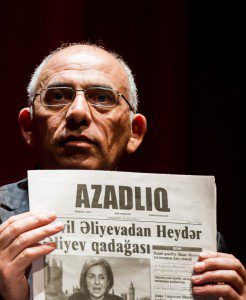
Rahim Haciyev, acting editor-in-chief of 2014 Index on Censorship Freedom of Expression Journalism Award-winning Azerbaijani newspaper Azadliq (Photo: Alex Brenner for Index on Censorship)
Civil, political and human rights are harshly restricted and frequently violated in Azerbaijan. Independent and critical journalists frequently find themselves — or their families — targeted.
Rahim Haciyev, acting editor in chief of the Index Award-winning independent newspaper Azadliq, was forced to flee Azerbaijan after years of official harassment. The government has repeatedly cracked-down on dissent.
Haciyev wrote to Index on Censorship from exile in a western European country:
I’m very sorry that the repressive policy of the Azerbaijani authorities against the Azadliq newspaper forced me to leave the country.
After the arrest of the newspaper’s financial director Faig Amirli, the authorities soon stopped issuing a print version. Amirli was arrested on obviously fabricated charges. I was summoned several times to the prosecutor’s office several times to testify about the paper’s financial affairs. The prosecutors said that this was connected with the criminal case of Amirli, but are invesitgating him under charges of “inciting religious hatred” and “violating the rights of citizens under the pretext of conducting religious rights”.
It turned out that they were interested in the financial issues of the newspaper in order to find a way to silence it. In addition, several employees of the newspaper were summoned for questioning. Then a court ordered tax authorities to comb through the paper’s financial activities. It’s clear that this was undertaken to increase pressure on the newspaper and me personally.
Aiming to cripple Azadliq, the government-owned distribution company was ordered to withhold circulation receipts — $84,000. So we weren’t able to print or even pay our bills. Three staffers are in prison — Seymur Hezi, Faig Amirli and Elchin. Each of them had sharply criticised the lawlessness and corruption of Azerbaijani officials.
In February, 11 Azadliq employees were summoned to the prosecutor’s offices to be interrogated again. Several government agencies increased their pressure on the newspaper’s online operation.
I had been warned twice in the past two years by the prosecutor general’s office that under my leadership Azadliq had been slandering Azerbaijani authorities. In their notices I was told that failure to comply with their terms would mean legal repercussions for me. But I refused. The newspaper continued to report on corruption, abuses of power and the absence of the rule of law. We were devoted to pursuing the truth.
And that is why the authorities intensified repression against the newspaper. Now this lawlessness has forced me to leave the country.
This decision was extremely difficult. I am cut off from my family and friends. I have two children and don’t know when I will see them again.
But despite all the problems I will continue to work daily for the newspaper’s website.
It’s my job, this is my job, this is my life.
Rahim Haciyev
Acting Editor-in-Chief, Azadliq
Haciyev is just one of the many journalists who have been targeted by Azerbaijani authorities in recent years. The country is ranked 163rd out of 180 countries in RSF’s 2016 World Press Freedom Index, which ranks 180 countries according to the level of freedom available to journalists. Almost everyone who speaks out against the regime of President Ilham Aliyev, including journalists, human rights defenders, activists and bloggers, are commonly imprisoned on spurious charges, such as drug and weapon possession, hooliganism and tax evasion. Reports of torture and abuse are typical by those being detained. At least 15 Azerbaijani prisoners of conscience currently remain in jail, including:[/vc_column_text][/vc_column][/vc_row][vc_row][vc_column width=”1/2″][vc_column_text]

Mehman Huseynov (Twitter)
Mehman Huseynov, an Azerbaijani journalist and pro-opposition blogger, was sentenced to two years in jail on 3 March by a Baku court for defaming the police chief of the city’s Nasimi district. Huseynov intends to appeal his sentencing. According to Front Line Defenders, a group of police officers violently attacked Huseynov on 9 January. The next he was brought to court, found guilty of disobeying police orders and fined 200 manat (£96). [/vc_column_text][/vc_column][vc_column width=”1/2″][vc_column_text]
Founder and editor of online news portal Kend.info Elchin Ismayilli was arrested on 17 February on charges of “extorting money” and “aggravated abuse of a position of influence”. According to the Caucasian Knot, he was also accused of blackmailing a local office, charges he insists were fabricated to silence his coverage of local corruption and human rights violations. On 18 February, Ismayilli was sentenced to a pre-trial detention period of 24 days. He has previously been subject to multiple arrests and cases of harassment related to his work as a journalist.[/vc_column_text][/vc_column][/vc_row][vc_row][vc_column width=”1/2″][vc_column_text]
On 3 March, a court decided to prolong the period of investigation of Faig Amirli for three months, the Azerbaijan Press Agency reported. Amirli, financial director of newspaper and assistant chairman of the Azerbaijani Popular Front Party (APFP), was arrested on 20 August 2016 for “inciting religious hatred” and “violating the rights of citizens under the pretext of conducting religious rights,” according to Radio Free Europe/Radio Liberty.[/vc_column_text][/vc_column][vc_column width=”1/2″][vc_column_text]
Writer and blogger Rashad Ramazanov was arrested on 9 May 2013 and sentenced to nine years in prison. According to English PEN, his charges included “illegal possession and sale of drugs”. Police claimed to have found nine grams of heroin on his body, although Ramazanov insists that the drugs were planted by the officers, who he claims also beat him up and tortured him during interrogation. Ramazanov was sentenced to nine years in prison in November 2013 on a trumped-up drug trafficking charge. PEN International reported that on 23 January Ramazanov was moved to solitary confinement for 15 days, the reason for which remains unknown. On 7 February Ramazanov was released from solitary confinement, and his family was given permission to visit him.[/vc_column_text][/vc_column][/vc_row][vc_row][vc_column width=”1/2″][vc_column_text]
Founder and editor of the website Azel, Afgan Sadygov, was sentenced on 12 January to 2.5 years in jail. Sadygov was arrested on 22 November 2016 based on accusations of “hooliganism” after he was attacked on 9 August 2016 and allegedly hit a woman, Contact Online news reported. Sadygov’s website often reports on issues such as poor infrastructure maintenance, bad quality of roads and waste of public funds in Azerbaijan’s Jalilabad region.[/vc_column_text][/vc_column][vc_column width=”1/2″][vc_column_text]
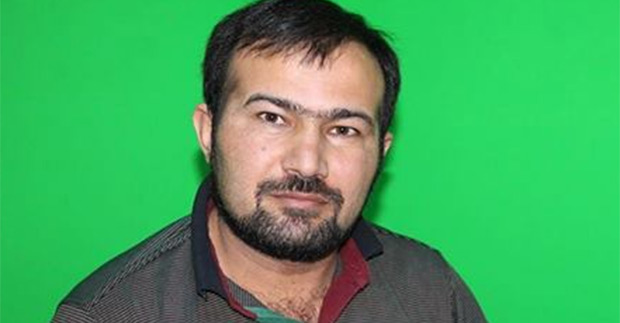
Seymur Hezi
According to MeydanTV, the Supreme Court will hear the appeal of Seymur Hezi, reporter for opposition news source Azadliq and presenter for critical TV program “Azerbaycan Saati” on 13 April. The journalist was sentenced to five years in prison on 29 January 2015 on a trumped-up charge of aggravated hooliganism, Index on Censorship reported. The charge came after Hezi was attacked on 29 August by Maherram Hasanov, a complete stranger, and defended himself. Hezi has accused President Ilham Aliyev and chief of staff Ramiz Mehdyev of ordering his arrest.[/vc_column_text][/vc_column][/vc_row][vc_row][vc_column width=”1/2″][vc_column_text]
The lawyer of Nijat Aliyev, former chief editor of religious website Azadxeber.org, has not been able to get hold of the text of the verdict of the Supreme Court of Azerbaijan for his client, Contact Online news reported. Aliyev’s lawyer believes that the delay has been intentional in order to prevent the filing of a complaint with the European Court of Human Rights, Contact Online news reported. According to IRFS, Aliyev was detained on 20 May 2012 and sentenced to 10 years in prison on 9 December 2013 on charges of illegal possession of drugs and weapons, incitement of religious hatred, calls to seize power and distributing banned religious literature. Aliyev’s website previously published criticisms of the government’s policies in regards to religion, the possibility of a LGBT parade in Baku and the allotment of too much funding for the Eurovision Song Contest in 2012, OCCRP reported.[/vc_column_text][/vc_column][vc_column width=”1/2″][vc_column_text]
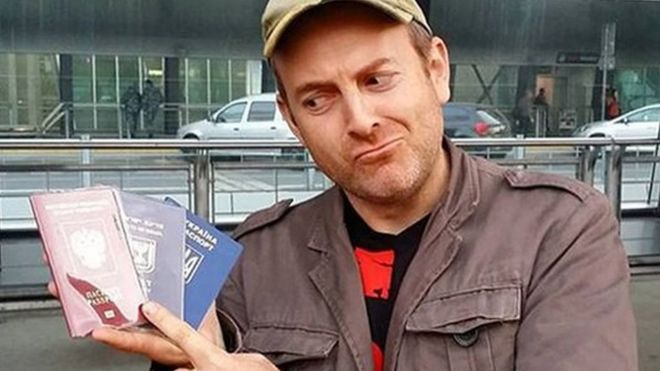
Alexander Lapshin (BBC)
Russian-Israeli travel blogger Alexander Lapshin was extradited from Belarus to Azerbaijan on 7 February. He faces up to five years in prison on charges of “public calls against the state” and “unauthorised crossing of borders,” according to Armenian News Agency ArmenPress. These charges came after Lapshin traveled to the disputed territory of Nagorno-Karabakh and sympathised in his blog entries with the Armenians he met, GlobalResearch reported. [/vc_column_text][/vc_column][/vc_row][vc_row][vc_column width=”1/2″][vc_column_text]
Fikrat Faramazoglu, editor-in-chief of news website jam.az, has been detained since 30 June 2016 on the charge of extortion by means of threats, which is punishable by up to five years in prison. According to Azerbaijan Free Expression Platform, these charges originated when a local restaurant owner accused Faramazoglu of extorting money from him when asked to remove defamatory articles about the restaurant on websites owned by the journalist.[/vc_column_text][/vc_column][vc_column width=”1/2″][vc_column_text]
Blogger and social media activist Abdul Abilov has been imprisoned since 22 November 2013. According to Azerbaijan Free Expression Platform, Abilov was charged with illegal possession, storage and manufacturing or sale of drugs when authorities claim to have found illegal drugs in his home and on his person, which Abilov continues to protest were planted on him. On 27 May 2014 Abilov was sentenced to five-and-a-half years in prison. Stop Sycophants!, the Facebook page previously run by Abilov, was shut down following his arrest, IRFS reported. The page was known to strongly criticise authorities.[/vc_column_text][/vc_column][/vc_row]




